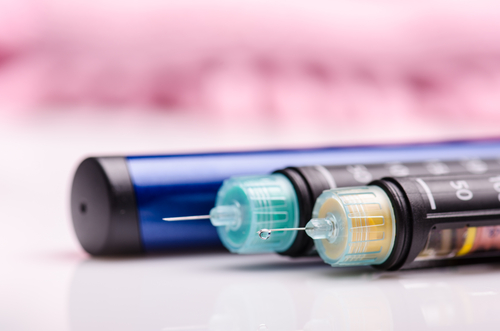If you or someone you love is diabetic, you know how painful it can be to have to draw blood multiple times a day. Some diabetics’ fingertips actually become calloused from pricking so often that they have to start drawing blood from toes and other body parts. Depending on the severity of the illness, a diabetic may have to draw blood as many as eight times a day to check blood sugar levels. Because of this, some patients neglect to check as often as they should which can lead to hyperglycemia, when blood sugar levels become too high or hypoglycemia, when levels plummet. Consistent high blood sugars can cause heart disease, blindness and other long-term complications, and low blood sugars can result in coma and even death.
Smart Insulin Can Automatically Lower Blood Sugar
Scientists from the University of Utah believe they have developed something that will stop the need for all of this finger pricking: Ins-PBA-F is a long-lasting insulin, or ‘smart’ insulin, that can self-activate when a person’s blood sugar levels increase. So far testing on mice has been promising, and just one injection worked for a minimum of 14 hours, during which it automatically and repeatedly lowered blood sugar levels after the mice were given amounts of sugar that were comparable to what they would consume in a meal.
Ins-PBA-Fs were found to mimic blood sugar levels in healthy mice where their own insulin was used. A study found that not only did smart insulin act identically in speed and kinetics as normal insulin processes in the body, but it also acts more quickly and is better at lowering blood sugar than even Levemir, which is a long-acting insulin currently on the market.
Danny Chou, Ph.D., USTAR investigator and assistant professor of biochemistry at the University of Utah said, “This is an important advance in insulin therapy. Our insulin derivative appears to control blood sugar better than anything that is available to diabetes patients right now.” The insulin derivative could begin human clinical trials within two to five years.
Advances in Diabetes Treatments are Still Lacking
Though there have been numerous advances in the treatment of diabetes in the past 10 years, such as insulin pumps and the development of various types of insulin, patients are still required to check their blood and manually adjust their insulin intake based on their levels at any given time. And, blood levels can vacillate significantly throughout the day based on numerous factors such as what the person ate and if they exercised. This makes it incredibly difficult to ensure appropriate insulin intake, and that’s a bad thing.
Smart insulin, which responds directly to the amount of glucose in the blood stream and automatically activates when blood sugar levels increase, would eliminate the dangers of inaccurate dosing. Other smart insulins currently under development use various protein-based barriers, such as gels or coatings, that inhibit insulin activation when blood sugars are low. But these components can also be their own source of trouble causing side effects such an unwanted immune response.
But the researchers at the University of Utah’s Ins-PBA-F is a different kind of smart insulin in that it was developed by chemically modifying insulin directly. The PBA, which stands for phenylboronic acid, is a chemical moiety (part of a molecule) that has been added to one end of the chemical chain, which helps the smart insulin bind to serum proteins in the bloodstream, blocking its activity. When blood sugar levels become high, glucose sugars bind PBA and that acts like a trigger to release Ins-PBA-F so it can do its job. Pretty smart.
An Easier Life for Diabetic Patients
Currently there is no clinically-approved glucose-responsive modified insulin on the market, but the development of this type of management approach has the potential to contribute to greater therapeutic autonomy for diabetics in the future.
Because Ins-PBA-F is a chemically modified version of a naturally occurring hormone, Chou believes it will be safe enough for diabetics to use on a daily basis, similar to other insulins that are on the market today.
“Before, a ‘smart’ insulin really meant delivering insulin differently,” says Chou. “Ins-PBA-F fits the true definition of ‘smart’ insulin, where the insulin itself is glucose responsive. It is the first in its class. My goal is to make life easier, and safer for diabetics,” he says.
What if there was a way to make life safer and easier for diabetics right now? Would you be interested to learn about a 100% natural protocol that could completely reverse the root cause of your blood sugar imbalances?
One medical expert says this is not only possible, but that patients can do it without needing to poke themselves countless times a day and take any potentially harmful medications.
Sound too good to be true?
In the free video on the very next page, she shares the details of this diabetes-reversing method and how you can learn a few simple tweaks to what you eat and how you move that can engineer a metabolic reboot so you can maintain healthy blood sugar levels for the rest of your life.
She even shares one specific step you can try immediately to help you get control of your diabetes today.
If you’d like to learn the strategies and tools to fix your blood sugar system without relying on drugs watch the video now.
 Validating...
Validating... 





Leave a Reply